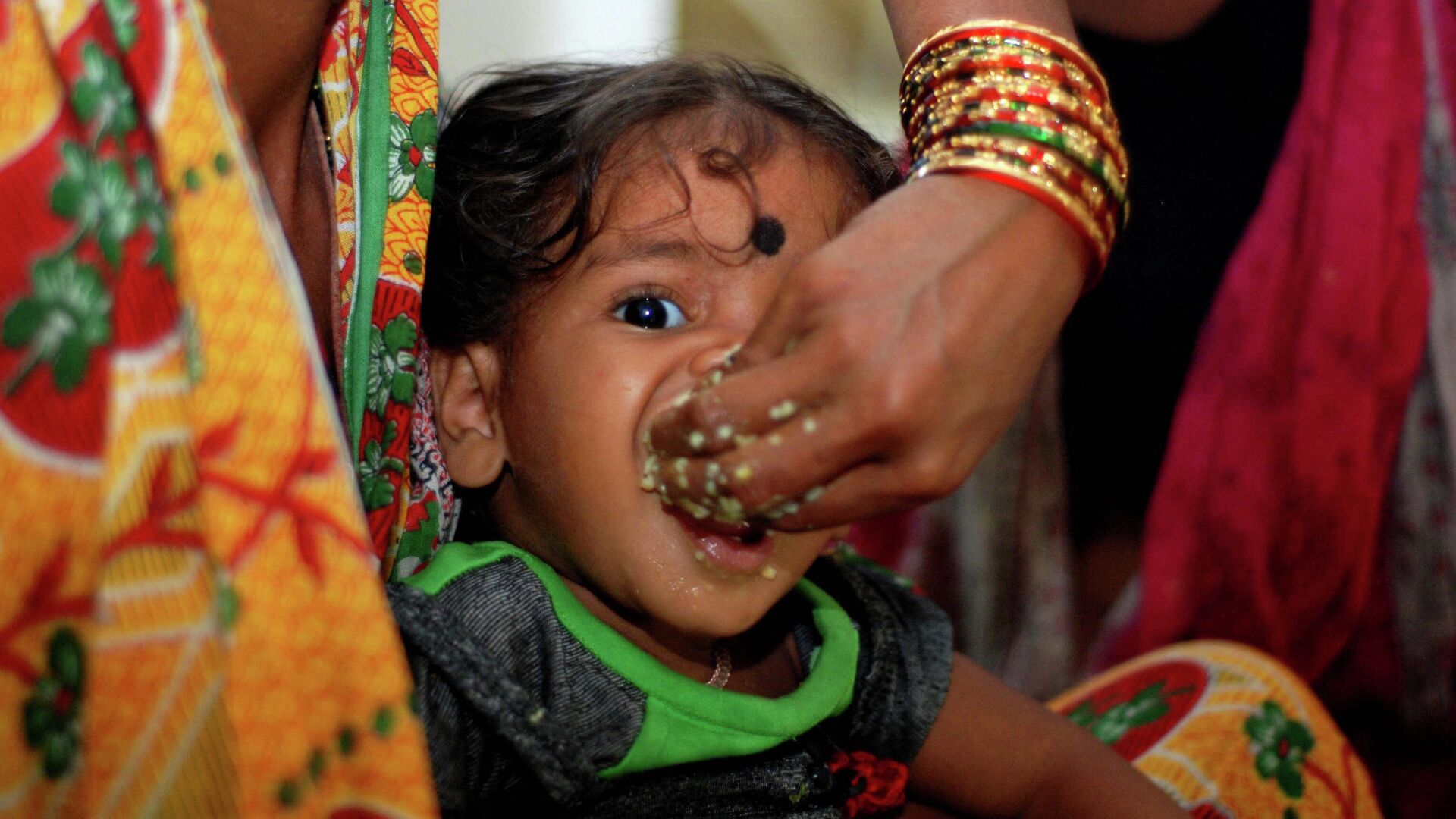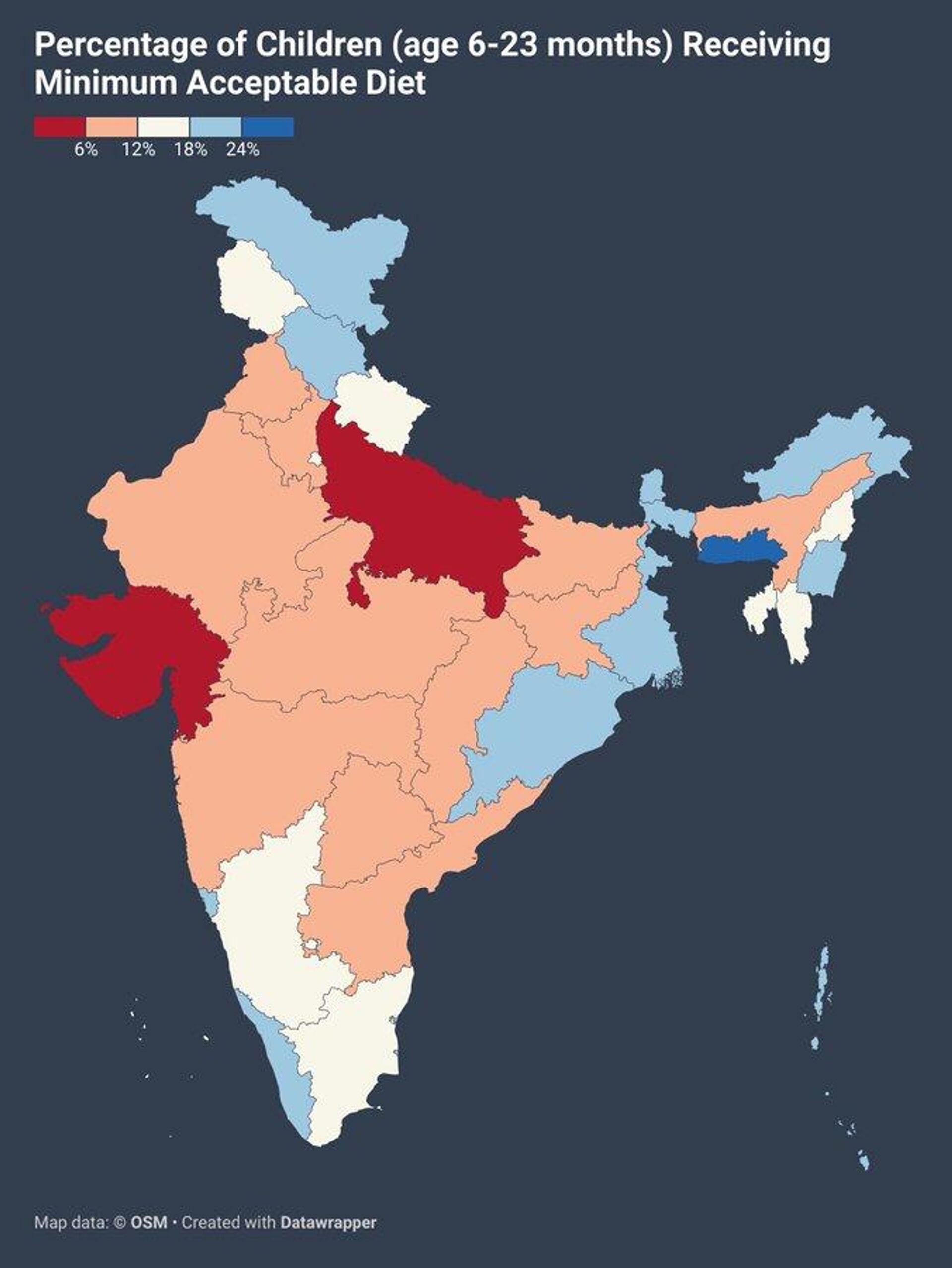https://sputnikglobe.com/20220511/indian-health-survey-reveals-89-children-aged-6-23-months-dont-get-adequate-diet-1095424463.html
Indian Health Survey Reveals 89% Children Aged 6-23 Months Don't Get Adequate Diet
Indian Health Survey Reveals 89% Children Aged 6-23 Months Don't Get Adequate Diet
Sputnik International
According to a report by UNICEF, titled “The State of the World's Children”, India registered the highest number of deaths among children below five years of... 11.05.2022, Sputnik International
2022-05-11T17:27+0000
2022-05-11T17:27+0000
2022-07-19T10:43+0000
child poverty
malnutrition
hungry children
world health organization (who)
https://cdn1.img.sputnikglobe.com/img/07e6/05/0b/1095435056_0:327:3059:2048_1920x0_80_0_0_07c8969566158c2a8fb60b15a5bce17c.jpg
Some 89 percent of Indian kids aged 6-23 months do not receive a "minimum acceptable diet", the country's National Family Health Survey (NFHS-5) has revealed.The 2019-21 survey found that adequate nutrition is not received by 88.9% of children aged 6-23 months who were breastfed, and 87.3 percent of non-breastfed kids in this category.The numbers, however, show a slight improvement over figures of the NFHS-4 survey, conducted in 2015-2016, when proper nutrition was not received by 91.3 percent of breastfed children and 85.7 percent of non-breastfed kids respectively.The NFHS is the most comprehensive database on a host of socioeconomic and health indicators focusing on women and children. Its basic results can be compared to the previous four rounds conducted in 1992-93, 1998-99, 2005-06, and 2015-16.According to the survey, the Indian states of Uttar Pradesh and Gujarat are the worst-performing states, with 5.9 percent of children aged 6-23 months receiving the minimum acceptable diet (or diet adequacy); while India's north-eastern state of Meghalaya was found to be the best performer, with 28.5 percent. A minimum acceptable diet (MAD) is an indicator for evaluating child feeding practices presented via the World Health Organisation. It is a combination of the minimum dietary diversity and minimum meal frequency. Infants and young children should have a minimum acceptable diet (MAD) to ensure appropriate growth and development. Otherwise, they are vulnerable to undernutrition, especially stunting and micronutrient deficiencies, and increased morbidity and mortality.The survey also shown that 67 percent of children aged 6 months to 5 years are anaemic, which is higher than the NFHS-4 estimate of 59 percent.Speaking with Sputnik, Dr Dipa Sinha, assistant professor at Delhi's Ambedkar University and known for her work on the Right to Food Campaign, said that the COVID pandemic has impacted nearly all socioeconomic indicators.She explains that this indicator remains the same as in 2015. "We were not even expecting it to improve, especially due to the COVID outbreak. These numbers are the direct indicator of child malnutrition — impoverished and underweight children".Dr Nehal Vaidya, a paediatrician, says a deficient diet in the first 1,000 days after the birth of the child has a huge effect on cognitive ability, including sensory and language capabilities.As per WHO guidelines, food like cereals and millets, pulses, milk and milk products, roots and tubers, green leafy vegetables, other vegetables, fruits, fat or oil, fish, egg, and other meats and sugar should be included in children's diet.
Sputnik International
feedback@sputniknews.com
+74956456601
MIA „Rossiya Segodnya“
2022
Deexa Khanduri
https://cdn1.img.sputnikglobe.com/img/07e4/0c/1e/1081607388_0:0:961:960_100x100_80_0_0_e9e931b8c1e18fb41f3074e2145d7a3a.jpg
Deexa Khanduri
https://cdn1.img.sputnikglobe.com/img/07e4/0c/1e/1081607388_0:0:961:960_100x100_80_0_0_e9e931b8c1e18fb41f3074e2145d7a3a.jpg
News
en_EN
Sputnik International
feedback@sputniknews.com
+74956456601
MIA „Rossiya Segodnya“
Sputnik International
feedback@sputniknews.com
+74956456601
MIA „Rossiya Segodnya“
Deexa Khanduri
https://cdn1.img.sputnikglobe.com/img/07e4/0c/1e/1081607388_0:0:961:960_100x100_80_0_0_e9e931b8c1e18fb41f3074e2145d7a3a.jpg
child poverty, malnutrition, hungry children, world health organization (who)
child poverty, malnutrition, hungry children, world health organization (who)
Indian Health Survey Reveals 89% Children Aged 6-23 Months Don't Get Adequate Diet
17:27 GMT 11.05.2022 (Updated: 10:43 GMT 19.07.2022) Deexa Khanduri
Sputnik correspondent
According to a report by UNICEF, titled “The State of the World's Children”, India registered the highest number of deaths among children below five years of age at 882,000. On top of this, India also has the highest number of malnourished children in the world.
Some 89 percent of Indian kids aged
6-23 months do not receive a "minimum acceptable diet", the country's National Family Health Survey (NFHS-5) has revealed.
The 2019-21 survey found that adequate nutrition is not received by 88.9% of children aged 6-23 months who were breastfed, and 87.3 percent of non-breastfed kids in this category.
The numbers, however, show a slight improvement over figures of the NFHS-4 survey, conducted in 2015-2016, when proper nutrition was not received by 91.3 percent of breastfed children and 85.7 percent of non-breastfed kids respectively.
The NFHS is the most comprehensive database on a host of socioeconomic and health indicators focusing on women and children. Its basic results can be compared to the previous four rounds conducted in 1992-93, 1998-99, 2005-06, and 2015-16.
According to the survey, the Indian states of Uttar Pradesh and Gujarat are the worst-performing states, with 5.9 percent of children aged 6-23 months receiving the minimum acceptable diet (or diet adequacy); while India's north-eastern state of Meghalaya was found to be the best performer, with 28.5 percent.
A
minimum acceptable diet (MAD) is an indicator for evaluating child feeding practices presented via the World Health Organisation. It is a combination of the minimum dietary diversity and minimum meal frequency.
Infants and young children should have a minimum acceptable diet (MAD) to ensure appropriate growth and development. Otherwise, they are vulnerable to undernutrition, especially stunting and micronutrient deficiencies, and increased morbidity and mortality.
The survey also shown that 67 percent of children aged 6 months to 5 years are anaemic, which is higher than the NFHS-4 estimate of 59 percent.
Speaking with Sputnik, Dr Dipa Sinha, assistant professor at Delhi's Ambedkar University and known for her work on the Right to Food Campaign, said that the COVID pandemic has impacted nearly all socioeconomic indicators.
"India has a scheme like mid-day meal, and ICDS (Integrated Child Development Scheme) under which a state government ensures nutritional food for children 0-60 months. But due to prolonged closure of schools, Anganwadi centres, mothers and newborns coming from economically backward classes are suffering disproportionately", Sinha says.
She explains that this indicator remains the same as in 2015. "We were not even expecting it to improve, especially due to the
COVID outbreak. These numbers are the direct indicator of child malnutrition — impoverished and underweight children".
Dr Nehal Vaidya, a paediatrician, says a deficient diet in the first 1,000 days after the birth of the child has a huge effect on cognitive ability, including sensory and language capabilities.
"The first six months of breast milk is no longer sufficient to meet the nutritional needs of the infant. Therefore, complementary foods should be added to the child's diet", Vaidya adds.
As per WHO guidelines, food like cereals and millets, pulses, milk and milk products, roots and tubers, green leafy vegetables, other vegetables, fruits, fat or oil, fish, egg, and other meats and sugar should be included in children's diet.



